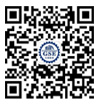In the summer of 2023, TANG Xin, associate professor at the School of Education, visited Finland and Greece delivering a series of academic presentations. The visit included (1) presentations in the annual conference of the Sino-Finnish Joint Learning Innovation Institute (JoLII); (2) an academic visit to Professor Katariina Salmela-Aro, who is the member of Academia Europaea and Finnish Academy of Science and Letters, at the University of Helsinki; (3) conference presentations at biennial conference of the European Association for Research on Learning and Instruction (EARLI) in Thessaloniki, Greece. Through his presentations, he shared his recent research findings on adolescents’ curiosity, engagement, and well-being.
Symposium Chair and Presentation at the 8th Annual Conference of the Sino-Finnish Joint Learning and Innovation Institute (JoLII)
The Sino-Finnish Joint Institute for Learning Innovation (JoLII) is a consortium jointly led by Beijing Normal University and the University of Helsinki. The consortium dedicates to combine the collective strengths of universities, basic education institutions, and various enterprises in both China and Finland. In total, the consortium consists of 11 Finnish and 14 Chinese universities/institutions. This year, the JoLII conference welcomed over 160 experts and scholars from more than 19 countries and regions.
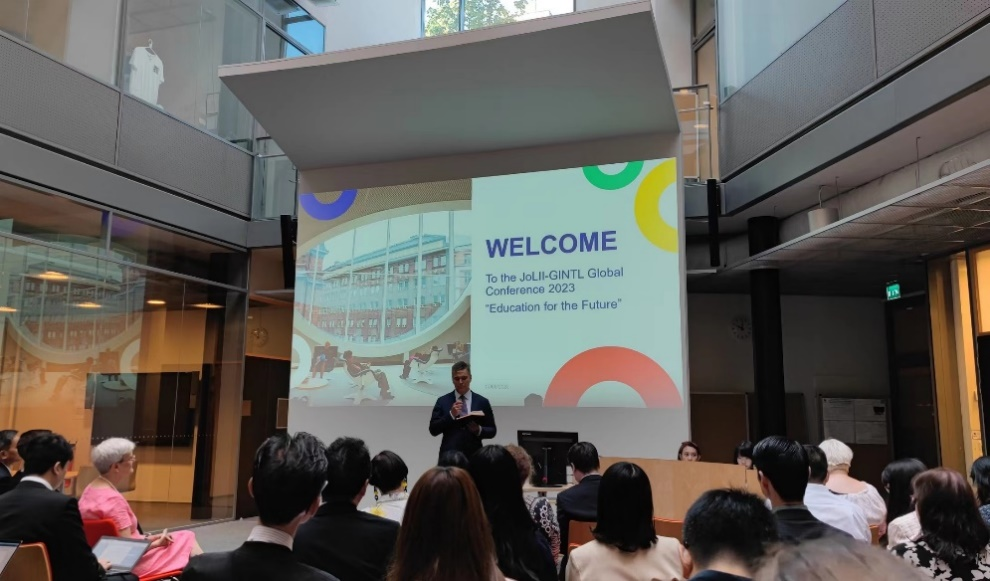
During the conference, TANG Xin chaired a seminar on Students' Mental Health and presented a research paper titled Killing the Cats or Satisfying the Human? The Role of Epistemic Curiosity in Adolescents' Multi-Dimensional Well-Being. The study aimed to examine the complicated relationship between curiosity and well-being. Research found that curiosity, on one hand, can positively impact adolescents' mental health due to its positive effect on learning. In contrast, on the other hand, research also found that high curiosity related to novelty seeking, such as smoking and drinking, which can have a negative impact on mental health. In order to uncover the complex relationship between adolescents’ curiosity and wellbeing, the study meticulously explored the interplays between two dimensions of curiosity (joyous exploration and deprivation sensitivity) and five dimensions of well-being experiences (physical, dietary, emotional, psychological, and academic) from a multidimensional perspective. Data from over 300 students in grades 4-6 were collected and analyzed using structural equation models. The findings revealed that joyous exploratory type of curiosity influenced each dimension of well-being positively, while the deprivation sensitivity had no significant effect. This study underscores that curiosity is primarily a positive factor, rather than an obstacle, to the well-being of Chinese adolescents. Moreover, it implies that we should provide greater support to joyous exploratory curiosity, thereby fostering the adolescents’ wellbeing.
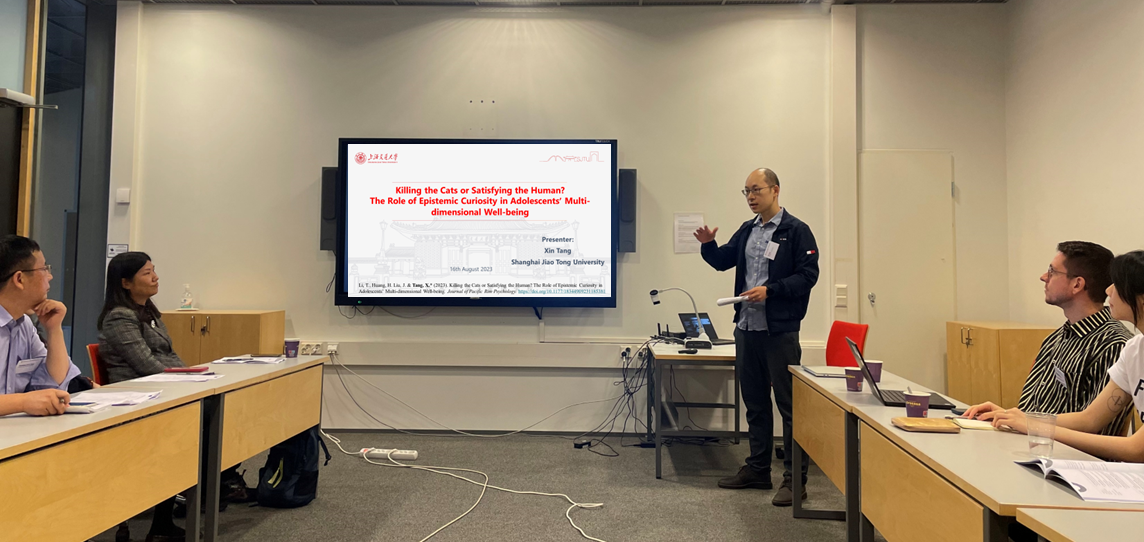
Academic Visit and Presentations to Professor Katariina Salmela-Aro’s Team at the University of Helsinki, Finland
TANG Xin also visited the Faculty of Education Sciences at the University of Helsinki, Finland, where he engaged in profound academic discussions with Professor Katariina Salmela-Aro's research group. Professor Katariina Salmela-Aro is Finnish Academy Professor, the member of Academia Europaea and of Finnish Academy of Science and Letters. In addition, she serves as the President of the IAAP Division 5 - Educational, Instructional and School Psychology. During the visit, TANG Xin presented his scientific research and had several collaborative discussions including joint paper writing and project applications.

TANG Xin delivered a presentation titled Expanding the Understanding of Curiosity: Perceptions, Well-being, and Most Effective Predictors. The presentation summarized his recent research findings on curiosity. In the first study, a survey including over 300 Chinese adolescents revealed that approximately one-third of students in school have negative attitudes toward curiosity. More importantly, what students are curious about in most time is unrelated to what they are learning in class. Follow-up studies have shown that curiosity among Chinese students is a facilitator for their well-being. The findings suggest that, on one hand, curiosity has a wide range of positive effects, including knowledge acquisition and well-being. On the other hand, most of the time, what students are curious about in school has nothing to do with their studies, which puts challenges for educators. If curiosity is such valuable, then how can we foster curiosity effectively? Using data from a large sample of surveys conducted by the OECD's Socio-Emotional Competence Project, TANG Xin revealed that enhancing students' sense of belonging to the school and strengthening the bond between students and teachers, emerges as pivotal strategies for stimulating curiosity.
Participation in the 20th Annual Conference of the European Association for Research on Learning and Instruction (EARLI) and Delivering a Series of Symposium Presentations
After completing academic activities at the University of Helsinki, Finland, TANG Xin traveled to Thessaloniki, Greece, to participate in the annual conference of the European Association for Research on Learning and Instruction (EARLI), where he delivered a series of symposium presentations. EARLI is one of the most influential conferences in the fields of education and educational psychology in Europe. The association publishes several influential academic journals, including Educational Research Review (Impact Factor 11.7) and Learning and Instruction (Impact Factor 6.2). This year’s EARLI Conference, hosted by Aristotle University of Thessaloniki and the University of Macedonia, attracted nearly 2,000 researchers from 55 countries and regions.
During the conference, TANG Xin delivered two symposium presentations. With three other researchers from the University of Amsterdam (Netherlands), the University of Tübingen (Germany), and the University of Virginia (USA), TANG Xin shared his recent research findings on curiosity. TANG Xin's presentation was titled "What do Chinese adolescents perceive and experience about curiosity in school?" This study examined Chinese students' subjective understanding of curiosity, including its definition, mechanism, and attitudes. Through thematic analysis of students' written responses, it was revealed that most students defined curiosity as attributes like a desire for knowledge and an inclination for exploration. Further analysis disclosed that only 31% of students were curious about classroom content. In other words, nearly 70% of students' curiosity in the school setting was unrelated to their formal curriculum. Additionally, nearly one-third of the students held a negative attitude towards curiosity. This research provides crucial insights into the challenges and complexities of fostering curiosity within the school environment, sparking widespread discussion and interest among the international academic community.
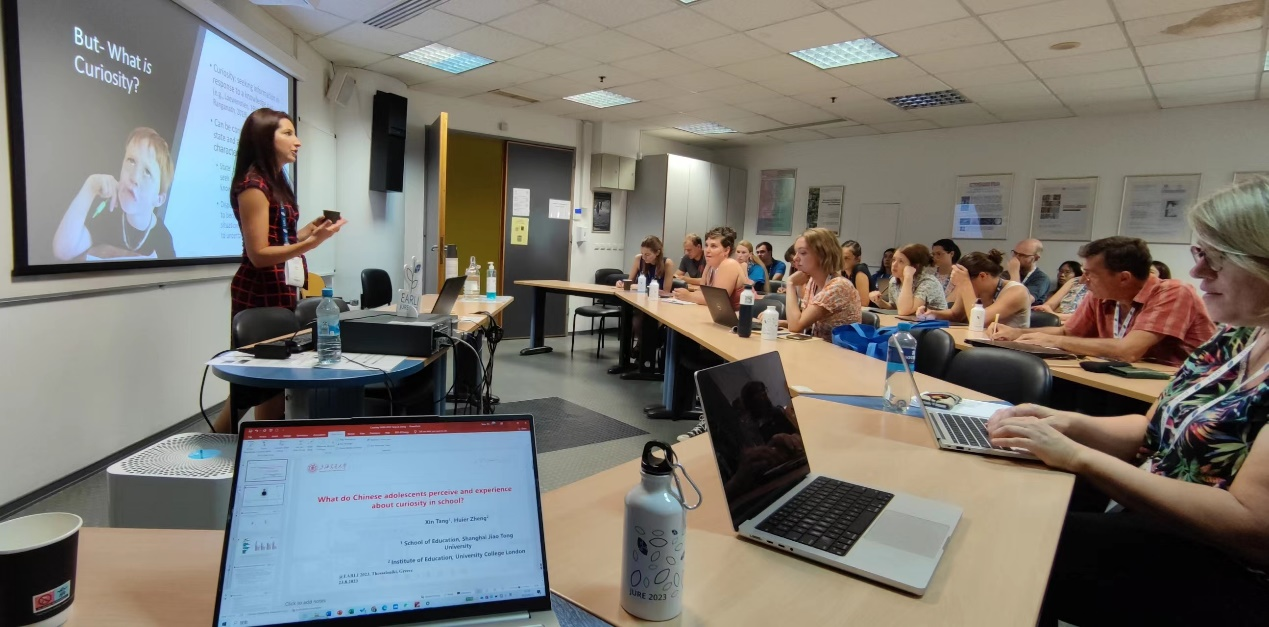
In the second symposium, TANG Xin, along with Professor Ann Renninger from Swarthmore College (USA), Professor Jennifer Symonds from University College Dublin/University College London (UK), and Associate Professor Ed Baines from University College London (UK), presented research on students' Momentary Engagement. TANG Xin delivered a study titled "Optimal Learning Moments in Finnish and US Science Classrooms: A Network Analysis Approach." The study introduced the concept of Optimal Learning Moments and explored their implications for learning in Finnish and US science classrooms. Employing a cutting-edge network analysis model to examine data from high school students in both Finland and the United States, the study revealed that Optimal Learning Moments can significantly enhance science learning, concurrently instigating a multitude of positive emotions and fostering experiences of academic achievement. Furthermore, possessing the right attitude towards science learning emerged as one of the pivotal factors in eliciting the sensation of an optimal learning experience. Additionally, moderate competition was identified as an accelerant for the manifestation of optimal learning moments. These findings implied insights on how to construct learning environments conducive to supporting optimal learning experiences.
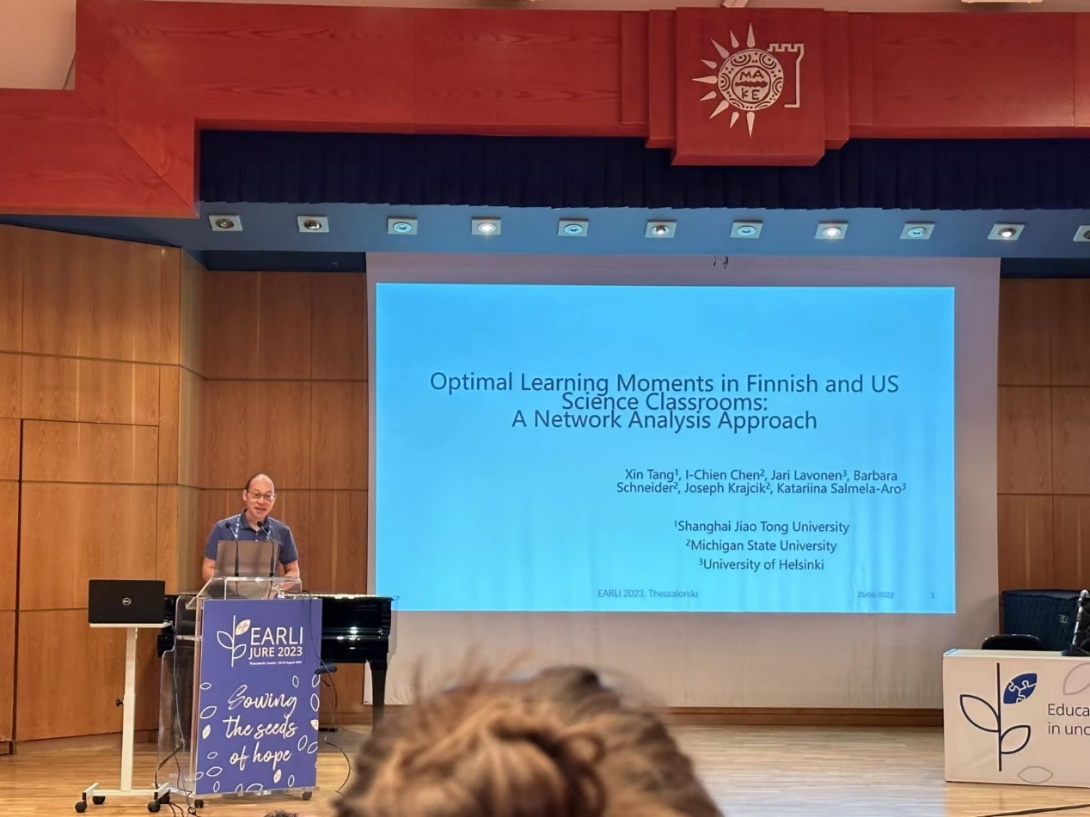
Participating the Emerging Field Group of the European Association for Research on Learning and Teaching (EARLI) as a Core Member
Following the conclusion of the EARLI Annual Conference, TANG Xin continued his visit as a core member of the Emerging Field Group (EFG), a research unit focusing on momentary engagement. This workshop was initiated by Professor Jennifer Symonds from University College Dublin, Ireland/University College London, UK and received funding from the European Association for Research in Learning and Teaching (EARLI). Team members are from United States, Germany, Austria, the United Kingdom, Finland, and China.
As the sole representative from China, TANG Xin engaged in extensive and profound discussions with other members. He presented his recent research findings and shared insights on constructing a novel, dynamic momentary engagement model. Throughout the seminar, project members collaborated on outlining future cooperative plans and successfully completed the outline of several joint papers.
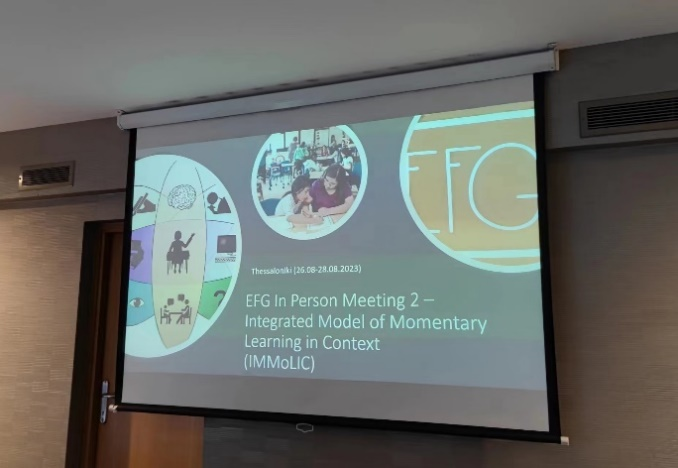
Personal Profile
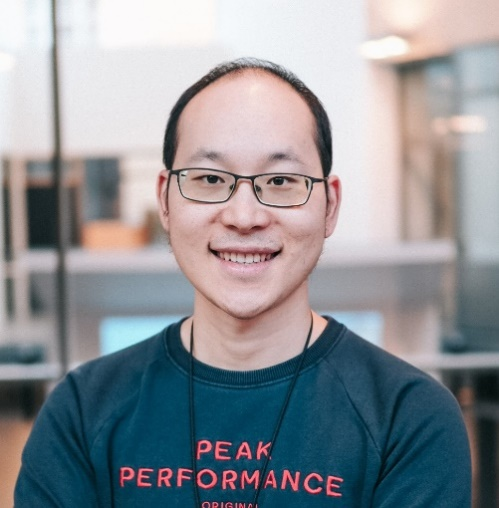
Dr. TANG Xin is an associate professor at the School of Education, Shanghai Jiao Tong University. He also holds the title of Docent (equivalent to Associate Professor) at the Faculty of Educational Sciences, University of Helsinki, and at the Faculty of Education and Psychology, University of Jyvaskyla. He earned his Ph.D. from the Faculty of Education and Psychology at the University of Jyvaskyla in Finland. He has been selected as one of Shanghai Thousand Talents and recognized as a Shanghai Pujiang Talent.
His research topics include motivation and engagement, academic wellbeing, social-emotional development, and teaching practices. So far, he has about 40 academic publications (17 in SSCI Q1 journals). As a lead author, his work has been appeared in highly regarded journals, such as Journal of Personality and Social Psychology (Impact Factor 7.6), Learning and Instruction (Impact Factor 6.2), Proceedings of the National Academy of Sciences (PNAS) (Impact Factor 9.58), Journal of Youth and Adolescence (Impact Factor 4.9), and Teaching and Teacher Education (Impact Factor 3.9).
He is currently a member of the Behavioral and Health Psychology Committee of the Chinese Psychological Association, and also serves as an editorial board member of several leading international journals, including Journal of Youth and Adolescence (SSCI Q1), Learning and Individual Differences (SSCI Q1), Journal of Applied Developmental Psychology (SSCI Q2), Educational Psychology (SSCI Q2), Journal of Applied Developmental Psychology (SSCI Region Q2), Frontiers in Psychology (SSCI Q1).
Written by TANG Xin
Edited by CHEN Ruoxi









